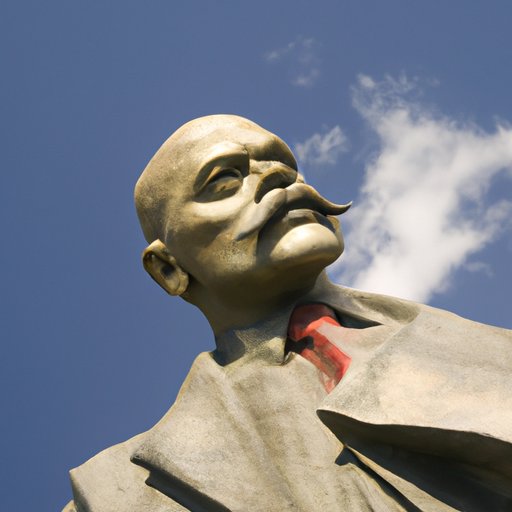Introduction
Vladimir Ilyich Ulyanov, more commonly known as Lenin, is one of the most influential figures in modern history. He was the leader of the Bolshevik Revolution in 1917, which established the first socialist state in the world. His rule ushered in sweeping changes in Russia’s political, social, and economic landscapes. But was Lenin a good leader?
Historical Analysis of Lenin’s Leadership Style
To answer this question, it is important to examine Lenin’s life, career, and leadership style. Lenin was born in 1870 in Simbirsk, Russia. He studied law at Kazan University, where he developed an interest in revolutionary activities. In 1895, he was arrested for participating in a protest against Tsar Alexander III and sent into exile. After his release, he continued to be active in the revolutionary movement and eventually rose to become the leader of the Bolsheviks, a radical Marxist faction of the Russian Social Democratic Labor Party.
In October 1917, Lenin led the Bolsheviks in a successful revolution against the Provisional Government. This ushered in a new era of socialism in Russia, with Lenin as its supreme leader. He implemented a wide range of reforms, including the nationalization of industry, land redistribution, and the establishment of a centralized government.
Lenin also introduced a number of measures to strengthen the Soviet Union’s political legitimacy. He created the Cheka, a secret police force tasked with eliminating opposition to the Bolshevik regime. He also allowed for the formation of soviets, or councils of workers and peasants, which were intended to give ordinary citizens a say in the decision-making process.
Examining the Impact of Lenin’s Policies on Russia
Under Lenin’s rule, Russia underwent dramatic economic, social, and political changes. Economically, Lenin introduced a series of reforms that aimed to modernize the country and make it more productive. These included the nationalization of major industries, the introduction of a command economy, and the implementation of free education and health care.
Socially, Lenin sought to create a classless society by redistributing wealth and abolishing the privileges of the nobility. He also enacted laws to protect the rights of workers and women, such as the right to vote and hold public office. Politically, Lenin established a one-party system and used the Cheka to suppress any opposition to the Bolshevik regime.
Assessing the Legacy of Lenin’s Rule
When assessing Lenin’s legacy, it is important to consider both the positive and negative impacts of his rule. On the one hand, Lenin’s reforms helped to modernize Russia and lay the groundwork for the country’s eventual transition to a market economy. He also successfully consolidated power and established a strong central government that could effectively manage the country’s resources. On the other hand, Lenin’s policies resulted in widespread poverty and repression, and his oppressive rule created a climate of fear and mistrust that lasted long after his death.
Comparing Lenin to Other Revolutionary Leaders
To gain a better understanding of Lenin’s leadership, it is helpful to compare him to other revolutionary leaders. Mao Zedong, Fidel Castro, and Ho Chi Minh all rose to power in the mid-20th century and sought to bring about radical change in their countries. Like Lenin, they all pursued policies of economic reform, social justice, and political suppression. However, unlike Lenin, they did not have the same degree of success in consolidating power or creating lasting political stability.
Exploring the Ideology Behind Lenin’s Leadership
At the core of Lenin’s leadership was his Marxist-Leninist ideology, which held that the working class should be the driving force behind revolutionary change. He also believed in the concept of “socialist internationalism,” which called for the unification of workers across the world and the creation of a global socialist society. These beliefs served as the foundation for his policies and formed the basis of his rule.
Conclusion
In conclusion, Lenin was a complex and controversial leader whose legacy is still being debated today. On the one hand, his reforms helped to modernize Russia and lay the groundwork for its eventual transition to a market economy. On the other hand, his policies resulted in widespread poverty and repression, and his oppressive rule created a climate of fear and mistrust that lasted long after his death. Ultimately, whether or not Lenin was a good leader depends on one’s interpretation of the effects of his rule.
(Note: Is this article not meeting your expectations? Do you have knowledge or insights to share? Unlock new opportunities and expand your reach by joining our authors team. Click Registration to join us and share your expertise with our readers.)
